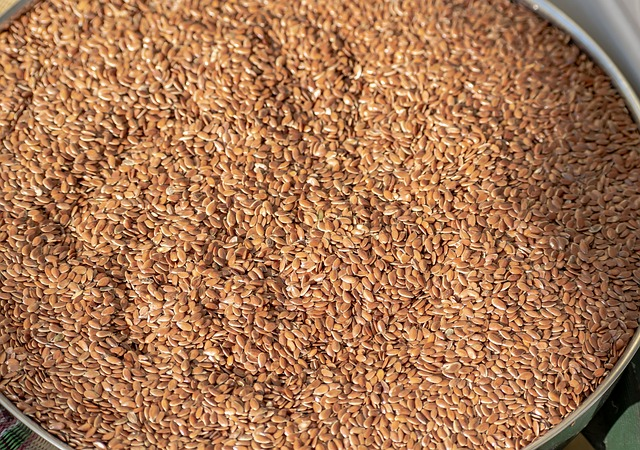Uncovering the Benefits of Flax Seeds: Nutrition, Health Benefits, and How to Eat
Flax seeds have been praised for their abundant health benefits and nutritional values. This article provides detailed insight into the ways flax seeds can benefit your wellbeing, from reducing inflammation to offering a wealth of vitamins, minerals, antioxidants, and proteins.
With its wide range of applications from culinary uses to topical skincare remedies, this article explores the versatility of this ancient superfood and how it can enrich the life of those who incorporate it into their diet.
With a deep dive into the many potential health benefits and evidence-driven recommendations on how to get the most out of flax seeds, this article uncovers the true power of this nutritious superfood.
Nutritional Value of Flax Seeds
Flaxseeds are a powerhouse of nutrition, like a superhero in the plant world. They are an excellent source of omega-3 fatty acids, which have been linked to improving cholesterol levels and reducing the risk of heart disease. Plus, they contain lignans – compounds with antioxidant properties that are found in plants.
One teaspoon contains nearly 2 grams of protein and both soluble and insoluble fiber. A tablespoon (7 grams) has 2 grams of polyunsaturated fatty acids (including omega 3s), 2 grams of dietary fiber, and 37 calories. Flaxseeds also boast one of the highest percentages of alpha linolenic acid (ALA), a type of essential omega-3 fatty acid found in plants.
Eating flaxseed may help reduce breast cancer risk, improve cholesterol levels, aid digestion, lower blood pressure, and ease arthritis symptoms. Studies suggest diets rich in ALA can lower cholesterol levels while decreasing ischemic heart disease and type 2 diabetes risks too! So don’t forget to add some flaxseed into your diet for healthful benefits galore!
Macronutrients
Flaxseeds are a powerhouse of macronutrients, packing protein, carbohydrates and dietary fiber. A single teaspoon contains a punch of 0.3 grams of protein, 0.6 grams of carbs and 1.6 grams of dietary fiber – enough to fill you up!
Mostly insoluble, the fiber in flaxseed passes through your intestine undigested like a ghost in the night – helping to improve digestive health and reduce constipation without leaving any trace behind.
Vitamins and Minerals
Flaxseeds are also a fantastic fountain of vitamins and minerals. Packed with lignans, tryptophan, lysine, tyrosine and valine – plus healthful fats mostly unsaturated – one tablespoon (7 grams) of ground flaxseed contains 1 gram of protein, 2 grams of fiber and 2.2 grams of omega-3 fatty acids.
But why choose flaxseeds over animal proteins? Studies show that adding them to your diet can help reduce cholesterol levels and improve heart health. Plus postmenopausal women who consumed the highest amounts of ALA had a lower risk for breast cancer – so what’s not to love?
Flaxseeds are widely available in health food stores as whole or ground. If you opt for the former, grind them in a coffee grinder or food processor; if you go for the latter, it’ll contain more omega-3 fatty acids than its whole counterpart! A tablespoon per day is enough to reap several health benefits – so why not give it a try?
Health Benefits of Flax Seeds
Flaxseeds are a tiny, yet mighty powerhouse of nutrition. But what are they? These small, brownish-colored seeds contain essential fatty acids, dietary fiber, minerals, vitamins and phytochemicals. So what health benefits do these nutritional powerhouses provide? Research suggests that consuming flaxseed can reduce the risk of cancer, improve cholesterol and heart health as well as ease symptoms of arthritis – making them a superfood for your wellbeing!
Reducing the Risk of Cancer
Studies suggest that flaxseed may be a cancer-fighting superfood, thanks to its high levels of lignans. These phytochemicals can help inhibit tumor growth and even improve survival rates in mice. But that’s not all – insoluble fiber found in flaxseed can also promote regular bowel movements and better digestive health. To top it off, a human clinical study showed that eating 25 grams of flaxseed for 40 days had a significant effect on reducing tumor growth in postmenopausal women with breast cancer.
Improving Cholesterol and Heart Health
There are many potential health benefits of consuming flaxseed, like a magic potion for your body. Research suggests that it can help reduce cholesterol levels, improve digestive health and even reduce the risk of certain cancers – making it an ideal choice for those with heart disease.
But how much should you consume? Studies have found that just 4 tablespoons (30 grams) of milled flaxseed per day can help lower LDL (bad) cholesterol levels – so why not give it a try?
Easing Symptoms of Arthritis
In addition to its many medicinal marvels, flaxseed is a powerhouse of health benefits. It can help improve digestive health like a soothing balm or relieve constipation like an elixir. Studies have found that eating ground flaxseed can be a magical remedy for hot flashes in postmenopausal women.
Flaxseed is also packed with dietary fiber, which can act as an antidote to constipation and stabilize blood sugar levels. The omega-3 fatty acids in flaxseed have been linked to reducing inflammation, providing relief from the aches and pains of arthritis – almost like a whisper of comfort!
How to Eat Flax Seeds
Flaxseed is a superfood that’s gaining traction for its potential health benefits. It comes in a variety of forms – seeds, oils, powders, tablets, capsules and flour – but ground flaxseed is the most digestible option. With a mild nutty flavor and crunchy texture, it’s best to start with a small amount to test your taste buds before adding more. When buying oil-based flaxseed products, opt for dark bottles in smaller sizes and store them in the fridge until their expiration date passes.
Flaxseed can be sprinkled on top of yogurt or salads as an extra crunchy topping; blended into smoothies or pestos; mixed into oatmeal or hummus; used as breadcrumbs alternative when coating chicken; added to muffin mixes for a nutty kick…the possibilities are endless! Plus, its soluble fiber content may help regulate blood sugar levels while polyunsaturated fatty acids could reduce heart disease risk.
Ground vs. Whole
Whole flaxseeds are like a locked door – difficult for the body to unlock and reap the potential health benefits. But grinding flaxseeds is like unlocking that door, allowing your body to absorb all of its goodness. It also helps slow down digestion, which can be beneficial when it comes to weight management. Whole seeds still provide some health benefits, but not as much as ground ones.
One tablespoon of ground flaxseeds contains around 1.7 grams of insoluble fiber – enough to keep your digestive tract healthy and happy! That’s more than double what you’d get from whole seeds (1,3 grams). However, too much insoluble fiber can lead to constipation, so it’s best to start small and gradually increase how much you consume over time.
Recipes
Adding flaxseed to your meals and snacks is a breeze! Whether you’re looking to add a nutty flavor or some extra fiber, flaxseed can be the perfect addition. Mix it into smoothies, oatmeal, yogurt, salads – even pestos and hummus! Or try adding ground flaxseed to muffin mixes for an extra 3 grams of fiber per serving. Flaxseed oil is another option that contains 7 grams of omega 3 fatty acids and 2 grams of alpha linolenic acid – but use sparingly as it’s high in fat and calories.
But what about potential health benefits? While there are many claims out there about how flaxseeds can lower blood pressure or cholesterol levels, it’s important to consult with your doctor before adding any supplementation to your diet.
So why not give flaxseeds a go? With so many possibilities when it comes to incorporating them into meals and snacks, you’ll never run out of ideas! Start small when adding ingredients to recipes – then increase according to taste. Who knows? You may just find yourself reaping the rewards of this super seed!
Summary
Overall, flaxseeds are a super-nutrient rich food that can be consumed in a variety of ways. Providing numerous health benefits through the vitamins, minerals, and dietary fiber they contain, adding flaxseeds to one’s diet is an easy way to improve overall wellbeing. Not only can they reduce inflammation and ease symptoms of arthritis, but they also have been shown to reduce cholesterol levels while helping individuals maintain heart health as well.
There are many options available when it comes to preparing flaxseed and incorporating it into favorite recipes or creating new ones. Flaxseeds can easily be added to just about any meal for an additional nutrient boost and great flavor.
A varied diet combined with regular exercise and dedication to leading a healthy lifestyle is the best method for achieving optimal health, and flaxseeds can certainly be part of a successful plan.
Frequently Asked Questions
How much flax seeds should i eat a day?
Based on the recommendation of 1-2 tablespoons a day, incorporating flaxseed into your diet can be an excellent way to add healthy fats and dietary fiber to your nutrition plan.
Enjoy the numerous benefits that flaxseeds have to offer by adding one to two tablespoons to your daily routine.
What are the 10 benefits of eating flaxseed?
Flaxseed packs a nutritional powerhouse of health benefits; its potential for promoting a healthy lifestyle is undeniable. Regular consumption of flaxseed can help improve digestion, reduce inflammation, promote skin and hair health, support heart and brain functioning, balance hormones, and keep your blood sugar in check.
Additionally, it’s an excellent source of antioxidants and essential fatty acids such as omega-3. So start incorporating this tiny powerhouse seed in your daily diet to reap all its health benefits!
What does flaxseed do for the female body?
Flax seeds are beneficial for the female body, helping to regulate hormone levels, regularize ovulation and menstruation cycles, and even enhance fertility. They may also help with PCOS (Polycystic Ovarian Syndrome).
So adding some flax seed into your daily diet can be a great way to support your health and well being.
Does flaxseed reduce belly fat?
Yes, flaxseed can help reduce belly fat; its fibre and monounsaturated fats aid weight loss and lower cholesterol levels.
Additionally, avoiding processed foods, exercising regularly and getting plenty of sleep will all complement the fat-reducing effects of flaxseed.
Is it ok to take flaxseed everyday?
Yes, it is generally safe and beneficial to take flaxseed everyday. Recommended daily intake varies and should be discussed with your doctor or a nutritionist to determine what’s best for you.
Taking flaxseed can help reduce inflammation, improve digestion, and provide essential fatty acids. It can also help to lower cholesterol and blood pressure, and may also lower blood pressure.









